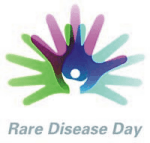 Today is Rare Disease Day 2009.
Today is Rare Disease Day 2009.
Join us in recognizing the reality of rare disorders and celebrating the beauty in the eyes of children living with rare disease and those who have lost their lives.
I help people navigate health and technology.
 Today is Rare Disease Day 2009.
Today is Rare Disease Day 2009.
Join us in recognizing the reality of rare disorders and celebrating the beauty in the eyes of children living with rare disease and those who have lost their lives.
Just found this excellent “how to share the day” post by PF Anderson:
http://mblog.lib.umich.edu/faceit/archives/2009/02/today_is_rare_d.html
It’s just fantastic a day is celebrated for rare disease, now we just need more doctor awareness and support for patients with rare diseases !
Susannah, so serendipitous that you posted this reminder. I was just embarking on a search for any studies that have been done that may indicate patients/caregivers living with rare diseases are having more trouble finding information/support on the Web than are those e-patients with more “popular” conditions. I know this sounds commonsensical, but I’m trying to find a good citation for this paper I’ve been working on.
Hi Judy,
I did some digging in my own files, but came up empty-handed. Most internet-intervention studies I’ve collected focus on more common issues like smoking cessation, back pain, obesity, diabetes, breast cancer, etc.
If anyone knows of studies focused on rare conditions, please post them here!
Not exactly what you are looking 4 but I hope it is helpful:
The Role of an Online Community for People With a Rare Disease: Content Analysis of Messages Posted on a Primary Biliary Cirrhosis Mailinglist
http://www.jmir.org/2005/1/e10/
ABSTRACT
Background: This study focuses on the role of an Internet-based group for people who have an autoimmune liver disease, primary biliary cirrhosis. Primary biliary cirrhosis is a relatively rare disease, affects primarily women in their 40’s and older, and is not well understood. The PBCers Organization (PBC stands for primary biliary cirrhosis) provides electronic mailinglists (listservs) and informational resources for those with primary biliary cirrhosis.
Objectives:
(1) to identify the issues of greatest importance to those posting to the listserv, specifically the relative importance of biomedical, socioemotional, and organizational/systems messages;
(2) to compare frequency and content of posts by people at different stages of disease;
(3) to identify how people with primary biliary cirrhosis represent the psychosocial challenges and dilemmas (role and identity change, uncertainty, and stigma) identified in the social-scientific literature as key elements of the experience of chronic disease.
Methods: The paper is based on content analysis of messages posted during two months to the Daily Digest listserv for people who have primary biliary cirrhosis. To analyze the posts, we developed a coding system with three major categories–biomedical, socioemotional, and systems/organizations–and 12 codes in each category.
Results: A total of 275 people posted 710 messages. Of the 250 people for whom information on gender was available, 239 (95.6%) were women and 11 (4.4%) were men. Analysis of 710 messages posted to the listserv revealed a predominance of requests for and reports of biomedical information, such as health care providers (32.7%), medications (30.9%), tests and procedures (25.8%), and symptoms (25.7%), combined with very frequent expressions of emotional support. The most frequent single topics were peer support (included in 40.6% of all posts) and positive emotions (25.3%). Posters who reported fewer years since diagnosis were more likely to be seeking biomedical information than those who were further in time from their diagnosis (r= -.241, P<.001, n=313). Those in later stages posted an average of 3.87 messages, compared to an average of 2.64 for people in earlier stages (t= 1.786, P=.08, n=90), which is different from what we expected. No relation between years since diagnosis or age and number of messages was found. Contrary to our expectations, the topics reflecting issues of role change/identity (2.9%), stigma (0.7%), and thoughts about the future (3.9%), all identified in social-scientific literature as key concerns for people with chronic illness, appeared infrequently in this set of messages. Conclusions: Messages exchanged on this particular mailing list have a biomedical, rather than socioemotional or organizational, emphasis. The Internet offers a highly valued opportunity for those with rare diseases to connect with, learn from, and provide support to others having similar experiences. Research that compares those with primary biliary cirrhosis, who are involved in an Internet support group and those who are not, would be an important next step to better understanding the role of the Internet among patients with chronic liver disease and the implications of it in the course of their illness. (J Med Internet Res 2005;7(1):e10) doi:10.2196/jmir.7.1.e10
Judy,
In fact I believe that the real answer is non-commonsensical!
For many, many rarer conditions the presence of the internet has made the sharing of information a natural and inevitable reality, usually in very focused and highly motivated communities of interest.
And therefore it has become much easier for people suffering from many rare conditions to find all there is to find about their condition than it is to find the all-encompassing site for the main chronic conditions.
Using the internet to find peace of mind about High Blood Pressure for example is NOT easy. But looking for info about leiomyosarcoma or renal cell carcinoma will almost invariable lead you to 1 or 2 online communities that will start to fill a very complex role, stretching from medical librarian to triage nurse, from physician assistant to best friend of the family, from patient sharing a bed in n hospital room to hospice volunteer.
Point well made, Gilles. Yes, I came across the article you cite. Another helpful article, at least from the POV of framing the challenge, is:
“Access to information supporting availability of medicines for patients suffering from rare diseases looking for possible treatments: the EuOrphan Service.”
Stakisaitis D, Spokiene I, Juskevicius J, Valuckas KP, Baiardi P.
Medicina (Kaunas). 2007;43(6):441-6. Review.
PMID: 17637514